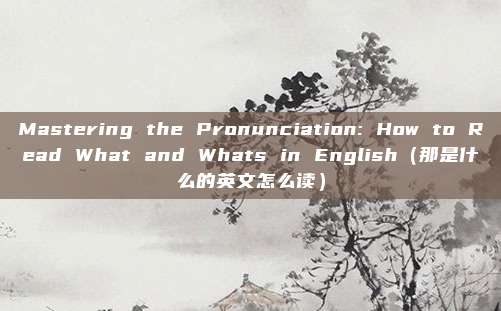Mastering the Pronunciation: How to Read What and Whats in English(那是什么的英文怎么读)
温馨提示:这篇文章已超过255天没有更新,请注意相关的内容是否还可用!
Introduction:
When it comes to learning English, pronunciation can be a challenging aspect for many learners. One common query that often arises is how to correctly pronounce the words "what" and "what's." Understanding the nuances between these two can greatly enhance your communication skills and overall fluency. In this article, we will delve into the pronunciation of "what" and "what's," providing you with valuable insights and tips.
Part 1: Pronouncing "What"
The word "what" is a fundamental interrogative word used to ask questions or express surprise. When it comes to pronunciation, "what" is pronounced as /wɒt/. Here are some key points to keep in mind:

1、The "w" sound is pronounced like the "w" in "water" or "wet."
2、The "a" sound is pronounced like the "a" in "cat" or "father."
3、The "t" sound is a soft "t" and does not produce a popping sound.
It is important to note that the "t" at the end of "what" is often not pronounced when it is followed by a vowel sound in a sentence. For example, in the sentence "What time is it?" the "t" at the end of "what" is not pronounced.
Part 2: Pronouncing "What's"
The abbreviation "what's" stands for "what is" or "what has." It is commonly used to ask questions or make statements. When it comes to pronunciation, "what's" is pronounced as /wɒts/ or /wɒtʃz/. Here are some important points to consider:
1、The "w" sound is pronounced like the "w" in "water" or "wet."
2、The "a" sound is pronounced like the "a" in "cat" or "father."
3、The "t" sound is a soft "t" and does not produce a popping sound.
4、The "s" sound is pronounced like the "s" in "sun" or "sit."
Similar to "what," the "s" at the end of "what's" is often not pronounced when it is followed by a vowel sound in a sentence. For example, in the sentence "What's your name?" the "s" at the end of "what's" is not pronounced.
Part 3: Practical Tips for Pronunciation
To improve your pronunciation of "what" and "what's," here are some practical tips:
1、Listen to native speakers: Listening to English speakers can help you get a better grasp of the correct pronunciation.
2、Practice with words: Practice saying "what" and "what's" in different contexts to become more comfortable with the pronunciation.
3、Record yourself: Recording yourself speaking can help you identify areas where you may need improvement.
4、Use resources: Utilize language learning apps, online tutorials, or pronunciation guides to enhance your skills.
Conclusion:
Mastering the pronunciation of "what" and "what's" is an essential step in becoming a proficient English speaker. By understanding the nuances and practicing regularly, you can improve your communication skills and enhance your overall fluency. Remember to listen to native speakers, practice regularly, and utilize available resources to refine your pronunciation.
References:
- The British Council. (n.d.). Pronunciation. Retrieved from https://www.britishcouncil.org/english/teaching-english/grammar-vocabulary/pronunciation
- Cambridge Dictionary. (n.d.). What's. Retrieved from https://dictionary.cambridge.org/dictionary/english/whats
网站文章、图片来源于网络,以不营利的目的分享经验知识,版权归原作者所有。如有侵权请联系删除!





还没有评论,来说两句吧...